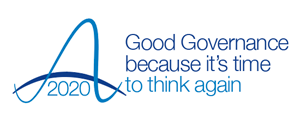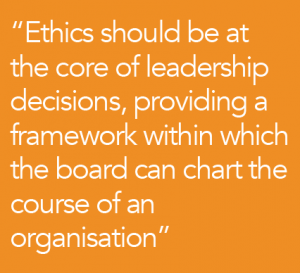Boardroom ethics
03 July 2020

"To value is the act of cherishing something, holding it dear, and also the act of passing judgment upon the nature and amount of its value as compared with something else.” John Dewey
In an earlier bulletin, we assessed how the COVID-19 pandemic presents some new and challenging ethical questions to front-line NHS staff and the boards governing them. Beyond the current crisis however, boards regularly face ethical considerations with important implications for the role of governance which are worth considering.
Boards are responsible for articulating the vision and values of an organisation, and maintaining assurance that the organisation does what it says it will do and behaves in the manner it has agreed.
Good boards and governing bodies have explicit discussions to frame their purpose and agree roles and behaviours. Often this results in the adoption of a formal etiquette and set of values to help promote better working and to underpin an effective governance culture. The Nolan Principles of Public Life are an example of this in the UK, outlining the ethical standards those working in the public sector are expected to adhere to.
The rising importance of ethics in governance
The role of ethics in governance is increasingly prominent and takes many forms. Current examples include the governing bodies of institutions considering the place and role of historical figures, organisations altering operations to reduce their carbon footprint, and advertisers boycotting social media platforms which are not seen to align with their values. Leadership, decision-making and effective governance are interwoven with ethics.
This ethical approach to governance is associated with the global shift from a focus on inputs to more of an outcomes-based approach to corporate reporting. The work of the International Integrated Reporting Council (IIRC), for instance, has provided a crucial framework for holistic value creation in the three domains of economy, society, and environment. Such efforts can be located within a movement for a more ‘conscientious capitalism’ that moves beyond the financial balance sheet as a sole measure of success and looks instead to long term sustainability in value creation.
Achieving this higher-order value often involves engaging with intangible entities, and requires boards to demonstrate both an ethical and evidence-based approach. The increasing range and complexity of stakeholder expectations is an important factor here. Demands from consumers, service users, and local communities that organisations are cognisant of their social and environmental impact are commonplace. Corporate social responsibility programmes, activist investors, and new domains of regulation are some of the other contributory dynamics involving ethical governance.
Tangible vs intangible
 In order to meet these more expansive success criteria, boards and governing bodies need to traverse the inherent conflicts between what might be called ‘tangible economic’ and ‘intangible social’ principles. For example, ‘tangible economic’ valuation devices such as cost-benefit analysis and the market pricing of land can be intersected with more ‘intangible social’ constructions around concerns for nature, the environment and community resilience.
In order to meet these more expansive success criteria, boards and governing bodies need to traverse the inherent conflicts between what might be called ‘tangible economic’ and ‘intangible social’ principles. For example, ‘tangible economic’ valuation devices such as cost-benefit analysis and the market pricing of land can be intersected with more ‘intangible social’ constructions around concerns for nature, the environment and community resilience.
Whether due to moral or pragmatic barriers, a variety of things are rendered intangible by their exclusion from the price system, ranging from human organs and emotions, to concepts such as environmental sustainability and community. The natural environment of a locality can be seen as a ‘priceless’ entity, the core understanding of which might be debased by attempts to attach a price value to it.
Managing the tension between value and values
Good governance should enable boards to achieve a balanced approach and to engage a range of ethical considerations in making and taking decisions involving difficult trade-offs. Board members must employ personal integrity as well as role-modelling organisational values in order to achieve this.
Ethics should be at the core of leadership decisions, providing a framework within which the board can chart the course of an organisation, and endeavour to manage the age-old tension between ‘value’ and ‘values’ within decision-making. We would invite board members to consider the following points:
- Is your board clear on its organisational values, and their implications for decision-making?
- What scenario-testing might you undertake to assess your board’s remit of ethical decision-making?
- Does your board consistently engage with economic, social and environmental domains of value within its discussions?
- How does your board assess ethical alignment when engaging in partnership working?
We are keen to hear your views. If this briefing prompts any questions or comments, please call us on 07732 681120 or email us at advice@good-governance.org.uk
Donal Sutton
Strategy Director
